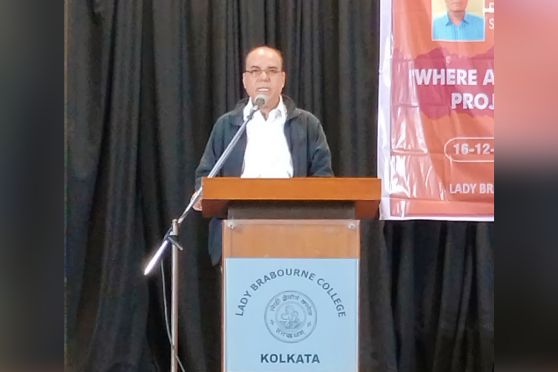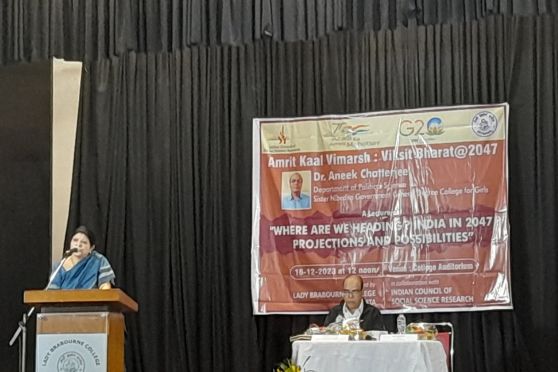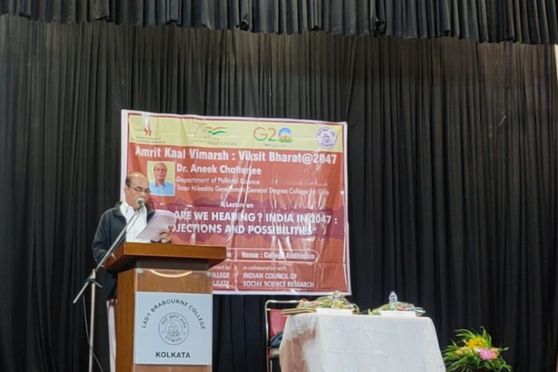Lady Brabourne College’s Vision: ‘Viksit Bharat @ 2047’; Navigating the Future Landscape


Lady Brabourne College, Kolkata, in collaboration with the Indian Council of Social Science Research, orchestrated a riveting symposium on ‘Where Are We Heading? India in 2047: Projections and Possibilities’ on December 16, 2023. Commanding the stage at the event was the erudite Dr Aneek Chatterjee, hailing from the Department of Political Science at Sister Nibedita GGD College for Girls.
The inaugural address delivered by Professor Siuli Sarkar, the college's Principal, ignited the attendees’ contemplation on India's destiny 24 years hence. She set the tone for the guest speaker, Dr Chatterjee’s subsequent exploration by posing evocative questions before the audience like “Can the light of development reach the poorest of the poor of our country?”, “How peaceful will our nation be in the future?”, and “What will be the status of women in a future India–will gender disparity decrease, if not disappear altogether?, etc".

In due course, Dr Chatterjee, a luminary in International Relations, dissected India's future across economic, military, maritime, foreign policy and socio-cultural development dimensions, as part of his detailed presentation. Unveiling staggering statistics, he underscored how India’s Gross Domestic Product (GDP) has been expanding at an average yearly rate of 6.5% since 2002. In fact, he informed us that prior to the liberalisation of the Indian economy in 1991, our country had a yearly GDP of 2.5-3.5%. Moreover, since the US Commerce department branded India as an 'emerging market' in 1995, foreign investments have been pouring into the country. In summation, he hailed India's imminent rise as the world's second-largest economy by 2050, while emphasising our need to make the imperative shift towards a robust manufacturing sector in alignment with 'Atmanirbhar Bharat' and 'Make in India' initiatives.
Beyond economic metrics, Dr Chatterjee advocated strategic initiatives, urging India to fortify its position in the Indo-Pacific region, enhance global policy engagements, and vie for a stronger presence in international forums. Stressing the urgency for heightened global participation, he championed India's pursuit of UN Security Council permanent membership and inclusion in the Nuclear Suppliers Group (NSG).
And yet, while forecasting a positive trajectory for India, Dr Chatterjee candidly addressed domestic challenges, emphasising the need for fortified social infrastructure, health, poverty alleviation, and literacy. Concluding optimistically, he declared, "India will either be a top power or a major power by 2047. If India manages to overcome its domestic constraints, she will take her top spot in global politics".

During the ensuing Question and Answer (Q&A) session, The Telegraph Online Edugraph probed Dr. Chatterjee asking, “With the changing dynamics of global governance, how is India contributing to addressing pressing global issues such as climate change, cybersecurity, and public health, and what challenges is she facing in doing so?”
Dr Chatterjee replied, “What is ‘global governance’? If we take the United Nations as an example of ‘global governance’, the organisation is doing well to address climate and economic issues from the Conference of the Parties (COP.2) to the Stockholm Convention on Persistent Organic Pollutants (POPs) etc. There are several cooperatives of nations which are tackling climate change unanimously. The issue at hand is so large that any country cannot accomplish it single handedly.” He cast a light on India's role in global governance, and lauded the nation's strides in climate change, cybersecurity, and public health. He emphasised India's shift from a follower to a norm-setter in addressing global issues
Finally, Professor Siuli Sarkar, the Principal of Lady Brabourne College, drawing inspiration from Rabindranath Tagore's Bilasher Pnash (The Snare of Extravagance), from his collection of essays titled Swasthya (Health) painted a sanguine picture of her views on the future of India to The Telegraph Online Edugraph through an analogy of holistic good health. She shared with us that being an inveterate optimist she foresees a bright future for India in our journey through Amrit Kaal. However, she cautioned against complacency declaring, “The thousand dollar question is how efficiently will India be able to combat economic inequality across the various socio-economic strata of our society? If the light of development does not reach all members of our society, its impact gets undermined. As a nation, we must ensure that all members of our community get to partake in the fruits of progress.”